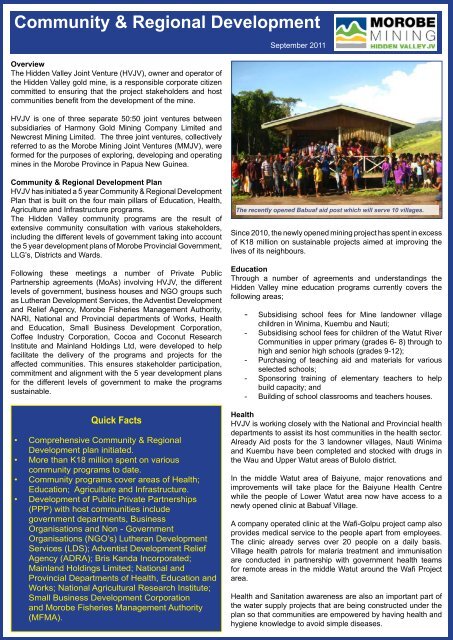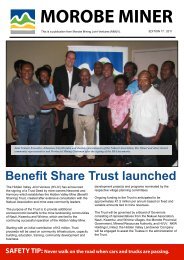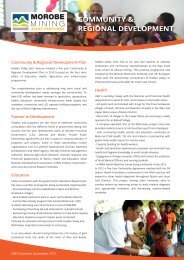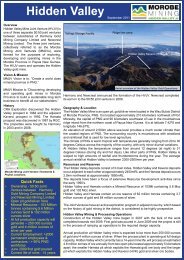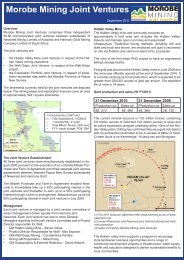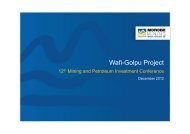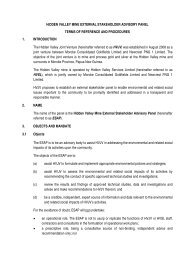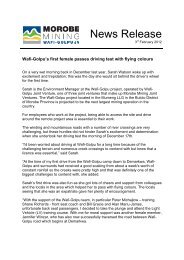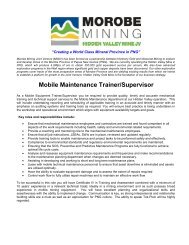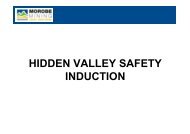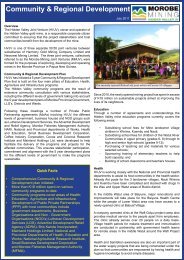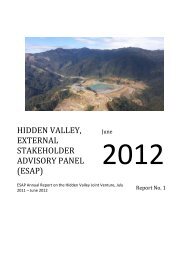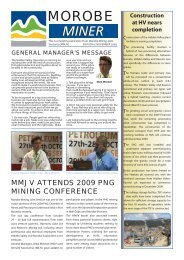Community & Regional Development - Morobe Mining Joint Venture
Community & Regional Development - Morobe Mining Joint Venture
Community & Regional Development - Morobe Mining Joint Venture
Create successful ePaper yourself
Turn your PDF publications into a flip-book with our unique Google optimized e-Paper software.
<strong>Community</strong> & <strong>Regional</strong> <strong>Development</strong><br />
Overview<br />
The Hidden Valley <strong>Joint</strong> <strong>Venture</strong> (HVJV), owner and operator of<br />
the Hidden Valley gold mine, is a responsible corporate citizen<br />
committed to ensuring that the project stakeholders and host<br />
communities benefit from the development of the mine.<br />
HVJV is one of three separate 50:50 joint ventures between<br />
subsidiaries of Harmony Gold <strong>Mining</strong> Company Limited and<br />
Newcrest <strong>Mining</strong> Limited. The three joint ventures, collectively<br />
referred to as the <strong>Morobe</strong> <strong>Mining</strong> <strong>Joint</strong> <strong>Venture</strong>s (MMJV), were<br />
formed for the purposes of exploring, developing and operating<br />
mines in the <strong>Morobe</strong> Province in Papua New Guinea.<br />
September 2011<br />
<strong>Community</strong> & <strong>Regional</strong> <strong>Development</strong> Plan<br />
HVJV has initiated a 5 year <strong>Community</strong> & <strong>Regional</strong> <strong>Development</strong><br />
Plan that is built on the four main pillars of Education, Health,<br />
Agriculture and Infrastructure programs.<br />
The Hidden Valley community programs are the result of<br />
extensive community consultation with various stakeholders,<br />
including the different levels of government taking into account<br />
the 5 year development plans of <strong>Morobe</strong> Provincial Government,<br />
LLG’s, Districts and Wards.<br />
Following these meetings a number of Private Public<br />
Partnership agreements (MoAs) involving HVJV, the different<br />
levels of government, business houses and NGO groups such<br />
as Lutheran <strong>Development</strong> Services, the Adventist <strong>Development</strong><br />
and Relief Agency, <strong>Morobe</strong> Fisheries Management Authority,<br />
NARI, National and Provincial departments of Works, Health<br />
and Education, Small Business <strong>Development</strong> Corporation,<br />
Coffee Industry Corporation, Cocoa and Coconut Research<br />
Institute and Mainland Holdings Ltd, were developed to help<br />
facilitate the delivery of the programs and projects for the<br />
affected communities. This ensures stakeholder participation,<br />
commitment and alignment with the 5 year development plans<br />
for the different levels of government to make the programs<br />
sustainable.<br />
Quick Facts<br />
• Comprehensive <strong>Community</strong> & <strong>Regional</strong><br />
<strong>Development</strong> plan initiated.<br />
• More than K18 million spent on various<br />
community programs to date.<br />
• <strong>Community</strong> programs cover areas of Health;<br />
Education; Agriculture and Infrastructure.<br />
• <strong>Development</strong> of Public Private Partnerships<br />
(PPP) with host communities include<br />
government departments, Business<br />
Organisations and Non - Government<br />
Organisations (NGO’s) Lutheran <strong>Development</strong><br />
Services (LDS); Adventist <strong>Development</strong> Relief<br />
Agency (ADRA); Bris Kanda Incorporated;<br />
Mainland Holdings Limited; National and<br />
Provincial Departments of Health, Education and<br />
Works; National Agricultural Research Institute;<br />
Small Business <strong>Development</strong> Corporation<br />
and <strong>Morobe</strong> Fisheries Management Authority<br />
(MFMA).<br />
The recently opened Babuaf aid post which will serve 10 villages.<br />
Since 2010, the newly opened mining project has spent in excess<br />
of K18 million on sustainable projects aimed at improving the<br />
lives of its neighbours.<br />
Education<br />
Through a number of agreements and understandings the<br />
Hidden Valley mine education programs currently covers the<br />
following areas;<br />
-<br />
-<br />
-<br />
-<br />
-<br />
Subsidising school fees for Mine landowner village<br />
children in Winima, Kuembu and Nauti;<br />
Subsidising school fees for children of the Watut River<br />
Communities in upper primary (grades 6- 8) through to<br />
high and senior high schools (grades 9-12);<br />
Purchasing of teaching aid and materials for various<br />
selected schools;<br />
Sponsoring training of elementary teachers to help<br />
build capacity; and<br />
Building of school classrooms and teachers houses.<br />
Health<br />
HVJV is working closely with the National and Provincial health<br />
departments to assist its host communities in the health sector.<br />
Already Aid posts for the 3 landowner villages, Nauti Winima<br />
and Kuembu have been completed and stocked with drugs in<br />
the Wau and Upper Watut areas of Bulolo district.<br />
In the middle Watut area of Baiyune, major renovations and<br />
improvements will take place for the Baiyune Health Centre<br />
while the people of Lower Watut area now have access to a<br />
newly opened clinic at Babuaf Village.<br />
A company operated clinic at the Wafi-Golpu project camp also<br />
provides medical service to the people apart from employees.<br />
The clinic already serves over 20 people on a daily basis.<br />
Village health patrols for malaria treatment and immunisation<br />
are conducted in partnership with government health teams<br />
for remote areas in the middle Watut around the Wafi Project<br />
area.<br />
Health and Sanitation awareness are also an important part of<br />
the water supply projects that are being constructed under the<br />
plan so that communities are empowered by having health and<br />
hygiene knowledge to avoid simple diseases.
<strong>Community</strong> & <strong>Regional</strong> <strong>Development</strong><br />
Road Infrastructure<br />
Under the infrastructure program, over<br />
K7.5 million for emergency repairs,<br />
maintenance and upgrade of the Lae –<br />
Bulolo highway has been spent, with an<br />
additional K400, 000 provided to develop<br />
the Wandumi access road linking Wau<br />
and Bulolo, as a restricted alternate<br />
route.<br />
Health and Education Infrastructure<br />
The company’s contribution towards<br />
capacity building doesn’t stop there.<br />
A substantively funded and ongoing<br />
education program for Hidden Valley<br />
and Wafi children has been expanded to<br />
cover most Watut communities.<br />
This has seen more than K1.7 million<br />
spent on education subsidies, providing<br />
better access to educational opportunity.<br />
The program also funds education<br />
infrastructure, teaching aids and teacher<br />
training.<br />
An aid post, elementary classrooms<br />
and community hall each in the three<br />
landowner villages of Nauti, Winima and<br />
Kwembu have been completed, at a cost<br />
of K1.5 million. The construction and<br />
fitting out of the Babuaf clinic in the Lower<br />
Watut area at a cost of K191, 000. The<br />
clinic will serve 10 villages. Construction<br />
of 8 school buildings (double highset<br />
classrooms) and three teacher’s houses<br />
at locations in Wau, Baiyune, Bulolo and<br />
at selected locations along the highway is<br />
progressing with 4 of the building already<br />
completed. Projects are in line with the<br />
Clean water supplies, more reliable than<br />
seasonal river flows, is brought right to<br />
community door steps.<br />
For more information, visit our website at www.morobejv.com<br />
Provincial Department of Education<br />
planned priorities for school infrastructure,<br />
through its SLIP Program.<br />
Water Supplies<br />
For many communities who face long<br />
daily walks to access fresh water supplies,<br />
more than K2.1 million has been spent<br />
on providing clean, reliable village water<br />
installations. The water supply program is<br />
accompanied by sessions of health and<br />
sanitation awareness.<br />
This program will improve life and<br />
community health in up to 40 villages<br />
throughout the Watut River region.<br />
The people of Golden Pine, Winima, Manki<br />
1, Manki 2, Kuembu 1, Kuembu 2 , and<br />
Society in the Upper Watut are already<br />
enjoying the benefits of clean fresh water,<br />
while progress on awareness, feasibility,<br />
soliciting village commitment to ensure<br />
ownership, and the ordering and delivery<br />
of materials are being progressed for the<br />
remaining villages of Kuembu 3, Nauti,<br />
Latep, and Leklu. All 13 villages in the<br />
Lower Watut are already enjoying the<br />
benefits of clean fresh water while in<br />
Middle Watut pre-feasibility studies are<br />
still progressing for Vidipos, Baiyune,<br />
Samsam, Pelengkua, Sambio (old &<br />
new), Galawo, Taiak, Gawapu, Bangalum,<br />
Biamena, Dambi, Kapin, Nayakes and<br />
Piu in the Middle Watut.<br />
Agriculture/Aquaculture Programs<br />
Along with clean water goes improved<br />
nutrition, and also addressed are<br />
agriculture and fish farming.Training is<br />
aimed at complementing the skills of<br />
the village people who depend on their<br />
land. More than K130,000 has already<br />
been spent on basic husbandry and Start<br />
Your Business trainings and extension<br />
services, with a further K130, 000 spent<br />
September 2011<br />
41 fish farmers from Sambio village in the Middle Watut who successfully completed a<br />
Business Management training in July conducted by Small Business <strong>Development</strong> Corporation.<br />
to date on cocoa farming in the Lower<br />
Watut region and K230,143 on fish<br />
farmer training, pond construction and<br />
stocking. Three fish farmer trainings<br />
for Lower Watut and 2 for Middle Watut<br />
have been completed while four model<br />
fish pond construction and stocking has<br />
been completed at four villages in Lower<br />
Watut which are Mafanazo, Magaring,<br />
Malasap, and Kisi-Ono. Fish are thriving<br />
in the ponds, and adding a new source of<br />
nutrition and family income.<br />
In an area where alluvial mining follows<br />
the rich history of gold production from<br />
the sands of the rivers of Wau and<br />
Bulolo, more than K16, 000 has been<br />
spent to send selected landowners and<br />
community representatives to the Wau<br />
small scale school of alluvial mining.<br />
This practical program was initiated by<br />
the Mineral Resources Authority and the<br />
European Union with the sponsorship<br />
commitment of Hidden Valley, to improve<br />
techniques and yields for small scale<br />
miners.<br />
Quick Facts<br />
• Up to forty villages spanning<br />
the Upper and Mid to Lower<br />
Watut areas will benefit<br />
from clean, reliable fresh<br />
water supplies and health<br />
and sanitation awareness<br />
training.<br />
• Over K 7.5 million spent<br />
on emergency repairs,<br />
maintenance and upgrade<br />
of the Lae - Bulolo Highway<br />
keeping this vital link open.<br />
• A K26 million power<br />
transmission line project will<br />
enable rural electrification<br />
opportunities for<br />
communities.


